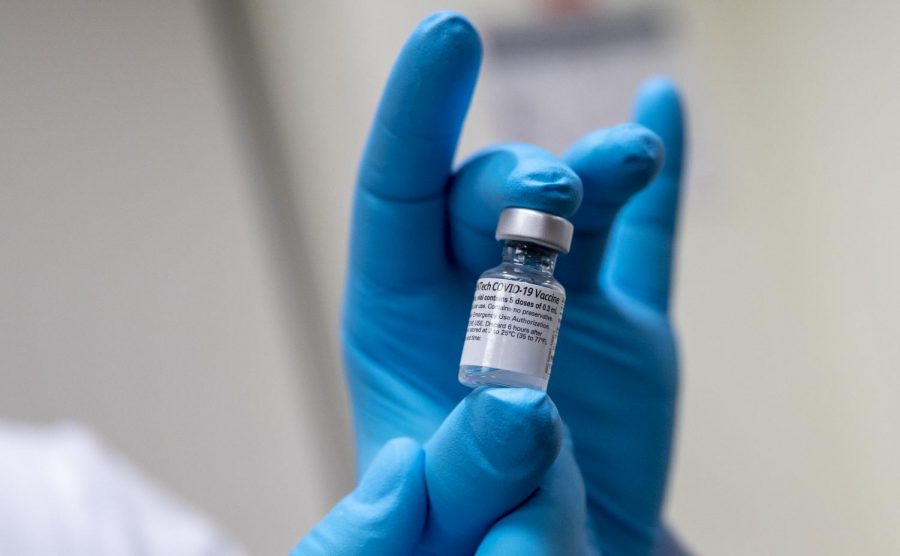FDA makes big authorizations on booster shots
The FDA gives the go ahead to two new booster shots and “mix and match” vaccinations
November 3, 2021
The FDA gave an emergency use authorization (EUA) to both the Moderna and the Johnson & Johnson (J&J) booster shots on October 20. The FDA also allowed people to get booster shots from a different company than their initial vaccine. This process is called “mix and match.”
The booster shots
The FDA authorized the Moderna and Johnson & Johnson booster shots on October 20. That was after the Pfizer booster shot received FDA approval in September. The Moderna booster shot, similar to the Moderna vaccine, uses mRNA technology. mRNA technology is different from the J&J vaccine and booster, which uses traditional vaccine technology.
There are numerous differences between mRNA and traditional vaccines. Traditional vaccines inject dead or weakened cells of a disease, which trains the immune system of the person getting the shot to detect and fight off the diseased cells. The vaccine is training the immune system to produce antibodies, proteins used to fight against foreign invaders to the body. Antibodies allow people to build immunity to the disease. mRNA vaccines also train the immune system to produce antibodies. However, they do it differently than traditional vaccines.
mRNA vaccines use viral proteins instead of dead or weak cells of the disease. According to MedlinePlus , “mRNA vaccines work by introducing a piece of mRNA that corresponds to a viral protein, usually a small piece of a protein found on the virus’s outer membrane. (Individuals who get an mRNA vaccine are not exposed to the virus, nor can they become infected by the vaccine.) Using this mRNA blueprint, cells produce the viral protein. As part of a normal immune response, the immune system recognizes that the protein is foreign and produces specialized proteins called antibodies.”
This has plenty of advantages over traditional vaccines. mRNA vaccines can’t accidentally infect someone with a disease, while traditional vaccines can. mRNA is also more efficient, cheaper and easier to scale up than traditional.
In short, the Moderna vaccine used mRNA technology while the Johnson & Johnson vaccine uses traditional vaccine technology.
The importance of “Mix and Match”
The FDA also approved the policy of mixing and matching vaccines, which allows people to get a second vaccine dose or a booster shot from a different manufacturer than their previous dose or doses. If someone wants a more effective vaccine than the one they initially received, or they negatively reacted to a specific vaccine, they can get a different dose from a different company. Mixing and matching vaccines is supposed to make putting booster shots into the arms of Americans easier and quicker.
“I think it is a good idea, my understanding is that the data shows that it works,” said Dr. Jeffrey Sumerson, an infectious disease doctor at Virtua Voorhees Hospital. “If it is easier to get one vaccine over another than whatever vaccine you can get is good.”
Dr. Sumerson also believes that getting a booster shot from a different company has no benefits over getting a booster shot from the same brand as someone initially got.
“I don’t think it is any better going from a Pfizer to a Moderna or a Moderna to a Pfizer than sticking with the same company,” he said.
Most of the RV student body is awaiting the chance to get a booster shot. Senior Devon Creelman said that she is getting the booster shot once it is available for her age group. That is because she “wants to be protected against COVID.”
Senior Anabella Chin said that she did not hear about the FDA approving mixing and matching vaccines. Chin said she will get the booster shot when they are available for her age group. That is because she “hopes it helps end COVID sooner.”
However, Freshman Kyle Bupp said that he is not getting a booster shot since he “already got the vaccine.” Similar to Chin, he has not heard about the FDA approving mixing and matching vaccines.
Who can get a booster?
The FDA authorized that anyone who got the Johnson & Johnson single-shot vaccine could get a booster shot since the J&J is consistently weaker than other vaccines like Pfizer or Moderna. According to the CDC, Pfizer and Moderna have their vaccines at about a 95% effectiveness rate at preventing COVID-19 in clinical trials, while the J&J only had 66.3% effectiveness against COVID-19 in clinical trials.
Unlike the J&J vaccine, people with Moderna are only authorized to get a booster shot by the FDA if they are a part of a high-risk group. That is similar to the FDA authorization on the Pfizer booster shot, which only allows people in high-risk groups to receive it.
According to the Mayo Clinic, people in high-risk groups include people that either have or are older, have lung problems such as asthma, have heart disease, and people with diabetes and obesity, along with other conditions.
Dr. Sumerson says it is important to get a booster shot. “Yes, I think it makes sense to get the booster shot, I don’t think it matters which you get,” he said.
However, he did have an note for people who got the Johnson & Johnson vaccine. “The only thing I would say is that if you got a Johnson & Johnson shot, I would probably boost it with either a Pfizer or a Moderna.”








Barbara Berr • Nov 3, 2021 at 4:45 pm
I was glad to read a clear, well written article about an issue confronting not only this country, but the world